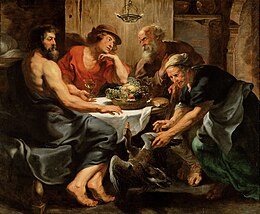
Back Xenia (Grècia) Catalan Gæstevenskab Danish Ξενία (αρχαία Ελλάδα) Greek Ksenio Esperanto Xenía Spanish קסניה HE Xenia (Görögország) Hungarian Xenia (antica Grecia) Italian 크세니아 (친절) Korean Xênia Portuguese

Xenia (Greek: ξενία) is an ancient Greek concept of hospitality. It is almost always translated as 'guest-friendship' or 'ritualized friendship'.[1] It is an institutionalized relationship rooted in generosity, gift exchange, and reciprocity.[2] Historically, hospitality towards foreigners and guests (Hellenes not of your polis) was understood as a moral obligation, as well as a political imperative.[1][3] Hospitality towards foreign Hellenes honored Zeus Xenios (and Athene Xenia), patrons of foreigners.[4]
The rituals of hospitality created and expressed a reciprocal relationship between guest and host expressed in both material benefits (e.g. gifts, protection, shelter) as well as non-material ones (e.g. favors, certain normative rights).[4] The word is derived from xenos 'stranger'.
- ^ a b Strootman, Rolf (2014). "Social Dynamics" Courts and Elites in the Hellenistic Empires: The Near East in the Achaemenids, c 330 to 30 BCE. Edinburgh: Edinburgh University Press. pp. Chapter 7. ISBN 9780748691272.
- ^ Anton Powell (1995). The Greek world. London: Routledge. ISBN 0-203-04216-6. OCLC 52295939.
- ^ Plato. "Plato, Laws, Book 12 Page 952-953". perseus.tufts.edu. Retrieved June 10, 2024.
- ^ a b Daniel Ogden, ed. (2007). A companion to Greek religion. Malden, MA: Blackwell Pub. ISBN 978-1-4051-8216-4. OCLC 173354759.